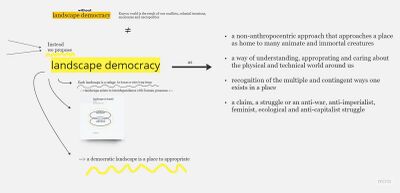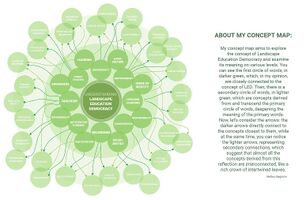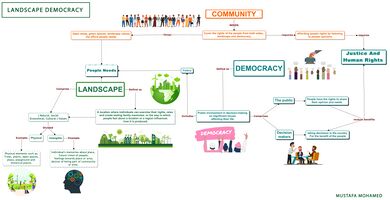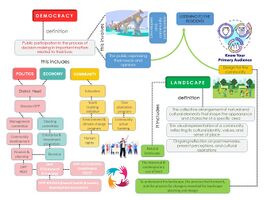Democratic Landscape Transformation 2023 - Team 2
>>> Back to working group overview
>>> Back to seminar reading list
>>> go to the Editing Help
Background of your team
- Please write a few words about your team.
- Which linguistic and cultural perspectives are you representing? Which disciplinary backgrounds?
Matteo Giagnorio: I am a Building Engineering and Architecture student at the University of Bologna, Alma Mater Studiorum in Italy. Currently, alongside my studies, I am working at an architecture and engineering studio in Bologna. Our studio specializes in the energy efficiency of buildings, as well as the design of neighborhoods and urban landscapes. My interests revolve around architecture that is grounded in the evolving understanding of buildings in the era of climate change, while also exploring the emerging forms of social interaction.
Mustafa Mohamed, I am an urban planner and landscape architect, I was born in Egypt. I had my bachelor degree at Cairo university and graduated in 2019.
i had worked as a landscape designer in many offices in my country, designing and redesigning many areas in Egypt and also in Saudi Arabia. i wanted to increase my knowledge as a landscape designer and learning new tools in analyses and taking many objects in consideration.
Munazza Nishat, I am from Pakistan and work as an architect.
Throughout my professional career, I had the opportunity to work on a variety of projects, including architecture, urban planning, and landscape design. As a result, I got really interested in learning more about landscaping in order to expand my skills as a landscape designer and to gain new techniques for analysing and taking various elements into account.
Maria Dimitriou-Tsaknaki, I am living in Greece and I have graduated from School of Architecture, AUTh, Thessaloniki in 2022.
I am considering architecture as member of a wider technical systems of political economy. I am interested in research on methods, techniques and tools (in digital and physical space) of sharing architecture knowledge and know-how as an educational process. I wonder how we can collectively know and transform the technical systems, construct common objects-tools, as aids in the creation of inclusive communities.
Currently I am working as an architect in a studio in Thessaloniki.
Your Landscape Democracy Manifestoes
Here you can add links to the manifestoes you have presented on April 26
- Mustafa Mohamed, https://www.mediafire.com/view/6kz6nbiyrbp2o6g/manifesto_Mustafa_mohamed.png/file
- Matteo Giagnorio, Manifesto https://miro.com/app/board/uXjVMQbMeIQ=/?share_link_id=887972050093
- Munazza nishat https://drive.google.com/file/d/18BBWLn1T-hy21895bTWh1aQxcVQE2gei/view?usp=drive_link
- Maria Dimitriou-Tsaknaki https://miro.com/app/board/uXjVMP5e4sw=/
Examples of Landscape Activism
In the session on May 10 you will discuss examples of landscape activism from your own contexts. You can share the examples in this section (link, image and/or short explanation).
Mustafa Mohamed,https://www.mediafire.com/view/bwyvs1bds71saxs/presentation.jpg/file
Matteo Giagnorio, Italy: A New Collective Landscape’ is an exploration of emerging Italian design
Munazza Nishat https://drive.google.com/file/d/1rfdJWLEC2X7JwP6M4QmTfTM9AzrydhW1/view?usp=drive_link
Maria Dimitriou-Tsaknaki No border camp / July 15-24 2016 https://noborder2016.espivblogs.net/files/2016/07/NoBoProgramPosterPRINT-1.pdf
https://noborder2016.espivblogs.net/files/2016/06/newspaper_NoBo_color.pdf
https://www.youtube.com/watch?v=gCXhow2Hs5I
The Role Play
In the session on May 17 you will present a small role play with your team. Please add here a short reflection on what you have learned from this play. The short list of landscape democracy 'movers and shakers' can be found here
Mustafa Mohamed,https://www.mediafire.com/view/bah6go16mxq2wez/presentation.png/file
Munazza Nishat https://drive.google.com/file/d/1FuTaGfZfQ3rtUwC9LypesRG8-yV382Iq/view?usp=drive_link
Matteo Giagnorio, playing Architect Giancarlo De Carlo:
Giancarlo De Carlo was an architect who believed that architecture should not be solely entrusted to architects, which sparked controversy. His collaboration with Ernesto Nathan Rogers ended due to personalistic management and cultural differences. De Carlo advocated for an open approach to architecture and joined Team 10, a group that challenged the teachings of renowned architects from the Modern Movement. In 1978, De Carlo published "Spazio e Società," emphasizing functional structures in urban design. He made significant contributions to the city of Urbino, reshaping it while respecting its historical reality.
https://en.wikipedia.org/wiki/Giancarlo_De_Carlo
https://www.artribune.com/progettazione/architettura/2018/09/giancarlo-de-carlo-storie-italia/
https://divisare.com/authors/2144759818-giancarlo-de-carlo/projects/built
>>> All information on the phase B activities is compiled in this PDF
Readings, concepts and definitions
- Start: April 5, 2023
- Due: July 5, 2023
Working in your group, express your personal understanding of the relation of landscape and democracy in the form of a concept map with linking words or any other diagrammatic representation. Please make your maps very visual and not just verbal. Think critically about why one map differs from another
About concept mapping
Before starting the exercise you can read this article by Joseph D. Novak & Alberto J. Cañas about Theory Underlying Concept Maps and How to Construct and Use Them. This paper gives a good explanation of how concept maps are conceived and developed.
You can use any tool you like for producing your concept map. However, since the result needs to be submitted digitally we recommend the following open source software for producing your maps:
- Cmap Tools >>> you can also work with your group on the Cmap cloud doing a shared map
- VUE - The Visual Understanding Environment
Please add your concept map(s) here
- Possible format: JPG (for wiki upload) or link to any other resource
- You may add one map per team member or an integrated one
- add as many additional materials as you need
Please finish with a short reflection
- What are the similarities and differences in your team regarding your understanding of what democratic landscape transformation is?
- The diagrams created by our team have certain commonalities, such as:
- open spaces and green areas
- community and human rights.
- participation and cooperation.
- fairness and justice.
- Our team's schematics differ in a number of ways, including:
- software skills, color coding.
- different visions of concept map.
- In how far did the seminar lectures and readings help you to clarify this?
- The lectures clarified these concepts for us by providing numerous examples and previous instances of what has and has not previously worked.
- We were also able to observe fresh innovations in practices that groups, organizations, and people are attempting in their key areas and which provide potential new methods, In order to further develop our understanding of landscape democracy in theory and practice in a wide range of contexts, an intercultural perspective on various ideas enlarged and questioned the efficacy of ideas and practices.
- What will you take home from this seminar?
- teach us how to be more open and involved in the planning and design processes.
- The course provided new information on how to promote democratic principles in society.



